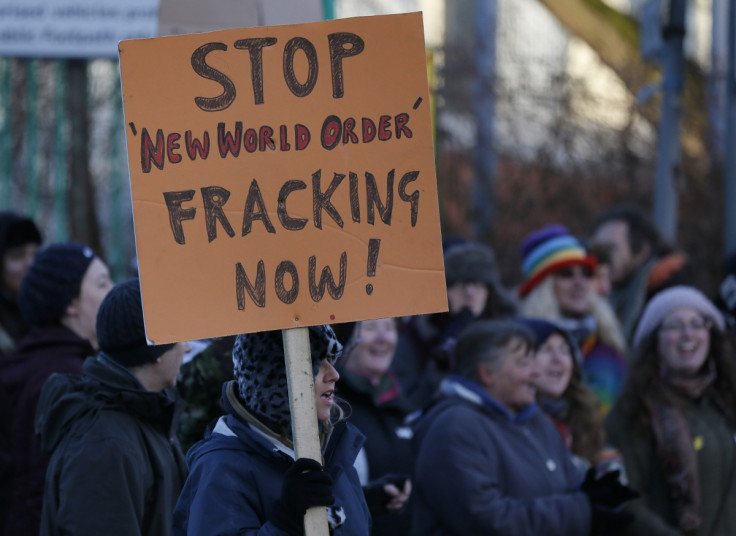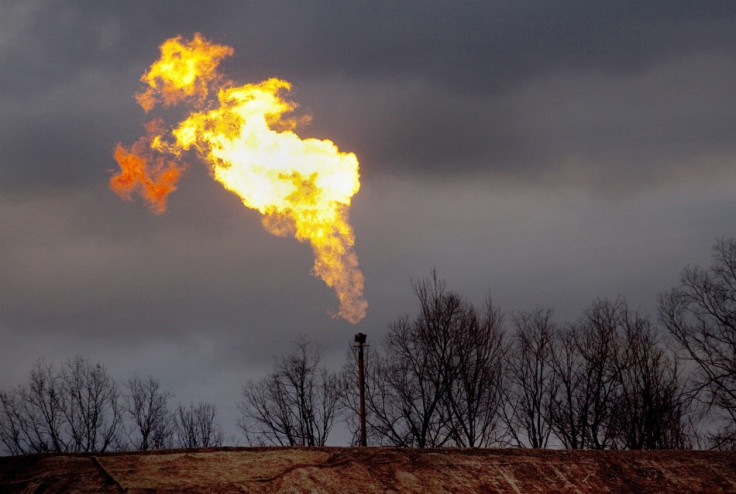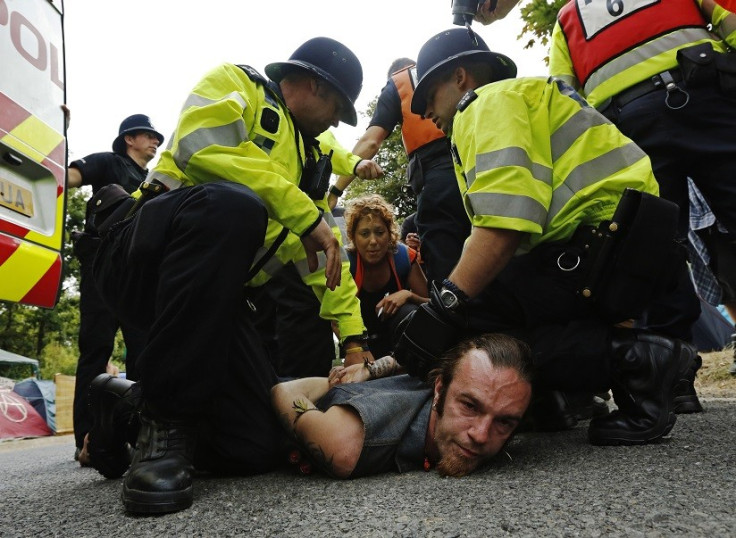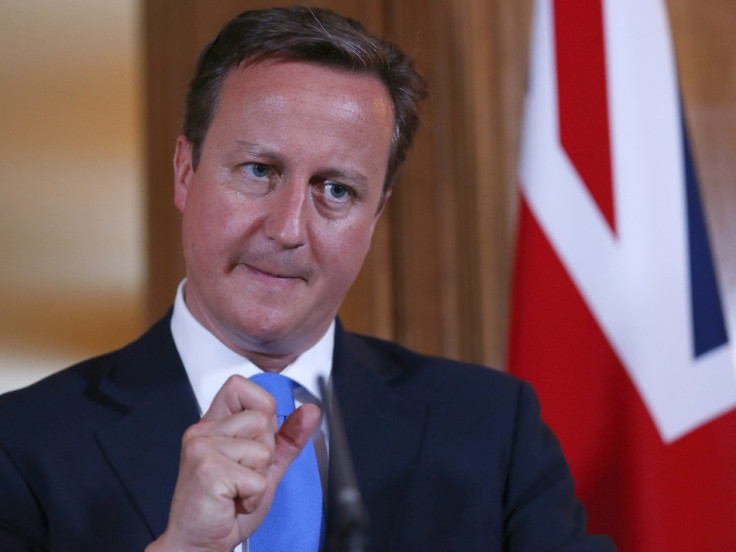What is the problem with fracking? Why Health and Environmental Debate is Moot
Health and environmental debate is moot

Fracking has become hugely controversial in the UK as the coalition government looks to push forward with the harvesting of shale gas resources.
Protesters have strongly opposed sites being set up, saying the process poses risks to health and the environment.
There have been demonstrations at exploration sites, most recently in Lancashire after Cuadrilla, one of the energy firms hoping to exploit shale gas, named Roseacre Wood and Little Plumpton outside Blackpool as potential sites.
The gas is extracted by drilling holes deep into the ground and using high-pressure liquid to fracture shale rocks to release the gas inside.
But what are the biggest concerns of the anti-fracking movement? And are they founded in evidence? IBTimes UK asks five experts about the potential environmental and health impacts of fracking.
If it weren't for natural gas, America would be cooking away with a lot higher rate of C02 emissions because nothing would have been done about it
Terry Engelder, professor of geosciences at Penn State University, said the environmental concerns were largely unfounded and that there was a large amount of "misinformation" about the process.
He said that in his experience of fracking in Pennsylvania, concerns over water management were limited and the risks of leaks were small. Fracking does, however, open up a wider argument.
"The place where the environmental debate is sharpest is in terms of what mankind is going to do about global climate warming, and what the role of replacing hydrocarbon fuels with sustainable non-hydrocarbon-producing energies is," he said.
On one hand, critics people say that hydrocarbon fuels should be shut down immediately "no matter the cost"; others, like himself, believe it has been helpful in reducing emissions.

"The real question boils down to one of how much money and how much national capital do you want to spend in terms of making this transition and can you do it within the context of an economy that's at a reasonably healthy rate. No one has the answer.
"If it weren't for natural gas, America would be cooking away with a lot higher rate of C02 emissions because nothing would have been done about it. Yet there is the other side that would argue that because we are still burning hydrocarbon fuels we are worse off.
"This is an industrial process which needs to be regulated because there are risks. The risks, however, are manageable. [Fracking] is an industry that if properly managed and regulated then everyone is in a win-win situation."
Separate from the environmental debate, Engelder said the political motives behind fracking often confused public perception: "There is just so much rhetoric and everyone has an opinion regardless of how poorly informed it is.
Unconventional fossil fuel extraction should not be taking place on or near agricultural land
"I gave a talk in Romania last fall and someone in the audience told me that Matt Damon, who did Promised Land, knows as much about fracking as I do. If that were really true you would be talking to Damon right now because he has more panache."
What about health impacts?
A recent study by Robert Oswald and Michelle Bamberger found that fracking poses a significant risk to livestock, with chemicals causing sickness in farm animals, leading to deaths, deformities and respiratory problems. They found 24 cases across six sites where animals had died after exposure to fracking chemicals.
They told IBTimes UK that common symptoms included burning of the nose, throat and eyes, headaches, vomiting, diarrhoea, rashes, and nosebleeds. They said animals were exposed through water and air contamination.
As a result many farmers suffered economic losses through deaths and reproductive problems. "We believe that unconventional fossil fuel extraction should not be taking place on or near agricultural land," they said.
Susan Nagel, of the Missouri School of Medicine, found in tests on clinical models that fracking chemicals can lead to birth defects and infertility in humans, with 12 of the chemicals tested having the ability to lead to hormone disruption.

She and her team were planning further laboratory tests to discover how fracking chemicals affect human physiology. She added that the lack of studies into health impacts was "critical" as at present, it "does not exist".
"We need to look at more reproductive health outcomes in people who live in these areas. We need to look at levels of these chemicals in people. And looking for these chemicals in drinking water is essential. As far as which chemical has the highest concentrations, we hope to find that out soon.
"There needs to be a large study to look at these chemicals in people. The potential route for exposure is certainly air and water as far as how close you have to be – we don't have the answer to that question."
Nagel also pointed to a lack of funding for research into the area: "The US Environmental Protection Agency two years ago announced there would be a funding mechanism to look at the health effects of fracking. Before they could even bring that to fruition, they withdrew. The funding has not been available."
A question of rhetoric?
Like Nagel, Bernard Goldstein, emeritus professor and former dean of the University of Pittsburgh Graduate School of Public Health, said there had been a distinct lack of funding into research on fracking, meaning evidence supporting or opposing the process was just not there.
"It's beginning to change, there are more studies being funded but they're coming a little late. Data is starting to accumulate but it takes time."
Goldstein said that undoubtedly the people most at risk from fracking were the workers. Unpublished data suggested there was an under-reporting of health problems and injuries in the industry.
"You're taking methane – a greenhouse gas – locked a mile below the surface and bringing it up and potentially putting it out into the world. What you're doing is bringing up underground methane that otherwise would have been there for geological eras," he said.
In his research, Goldstein found one of the main problems people have with fracking is a lack of trust and transparency.

"What you're saving in greenhouse gases is that natural gas displaces coal so you've got a trade-off. I think the trade-off is generally positive, in that we will come out ahead, but I think that's the wrong question - that's the argument the industry has been using.
"The right question is that none of that methane should be released except if it's burned to replace coal or oil, to the extent that [industry leaders] should be able to protect from greenhouse gas emissions. To say that it's better than coal is not an effective way of looking at it. We must regulate this to the point that it's in the industry's best interests not to have one molecule get out."
The public just wants to know 'is this going to contaminate my groundwater?'
Goldstein said that one of the main problems with defining the heath risks of fracking was that they will vastly differ from place to place because of geological differences.
"There are thousands of differences from site to site. The only answer you can give as a doctor is that you've got to be lucky," he said.
In his research, Goldstein found one of the main problems people have with fracking is a lack of trust and transparency. People will perceive something to be more concerning or dangerous if we are not familiar with it and if we do not trust the people who are pushing it ie, politicians and fracking companies.
Another problem that leads to confusion among the general public is the rhetoric around the issue. People are told that it is a "wonderful new technology" but one that has been done for 60 years.
"It can't be a brand new technology that you've being doing for 60 years," Goldstein said.
"This is a new technology in the sense that the kind of issues that have come up. We need to understand our experience and not generalise."
He also noted that there were disparities in technicalities regarding contamination: "The industry has a very narrow definition of hydro fracturing, which is the successful release of chemicals 5,000ft underground.
"The public just wants to know 'is this going to contaminate my groundwater?' They don't care if it's from a truck that's overturned or a pond that leaked or the weld casing broke. They just care if the chemicals are going to get into the groundwater. When the industry uses their narrow definition, they're not using the definition the public is using and what we understand about risk assessment and the responsibility of industry."
Will it break in transit?
As Goldstein points out, fracking appears to work in the US, but it is almost impossible to give definitive risks because of the lack of research and the geological differences.
Jim Watson, research director of the UK Energy Research Centre, said public acceptance would be the biggest problem facing the UK government in terms of implementing fracking. He also noted lack of research was causing further problems.
"There's an issue of evidence about exactly how much shale there might be in the UK, at what cost you might be able to get it out of the ground and what impact it might have on energy bills."
Watson believes the government has failed to engage the public over fracking and explain the real needs of the country

He said that while some politicians were realistic about the fairly minimal evidence about its potential benefits, others were making unfounded claims of what shale might do.
"In the short to medium term clearly the big issue is public acceptance - even to do things like test drilling, which will, of course, give us better evidence on what the costs are going to be of extracting it."
There are questions to be asked given what we've just been through with flooding about the resourses of the environment agency
Watson said the difference with the US is that it started fracking before the "shale revolution" and the country has a much bigger electricity system so the technology has reduced carbon emissions by switching from coal. He said the UK had already mostly switched from coal to gas, so realistically it made more sense to look to renewables.
Speaking about how much fracking will cost to set up and if it would be worthwhile financially, he said: "That's a really difficult question to answer. It's a real chicken and egg problem because there have been hardly any test wells and test fracks done in the UK.
"Until they do more tests then you're not going to have the information to know enough about the geology to then know about the costs and the economics of doing this.
"Of course, all the companies to do the testing are obviously willing to take the risk in the hope that there will be a payoff but I'm sure none of them are sure what that's going to mean."
Watson said that safety regulations in the UK could be applied to fracking but noted that concerns still had to be addressed.
"There are questions to be asked given what we've just been through with flooding about the resourses of the environment agency," he said. "Have they got enough resources to regulate effectively if this industry really takes off and grows fast in multiple sites?"
So where has it all gone wrong? Watson believes the government has failed to engage the public over fracking and explain the real needs of the country.
"I'd rather they looked at things as a whole and said 'our energy infrastructure needs to change for all kinds of reasons, emissions, energy security, prices and so on'.
"What we need is people's engagement with the choices that they made and people's involvement. Instead, they've really pushed it on the fracking. I think then, rightly or wrongly, it leads to perceptions in people."
© Copyright IBTimes 2025. All rights reserved.






















